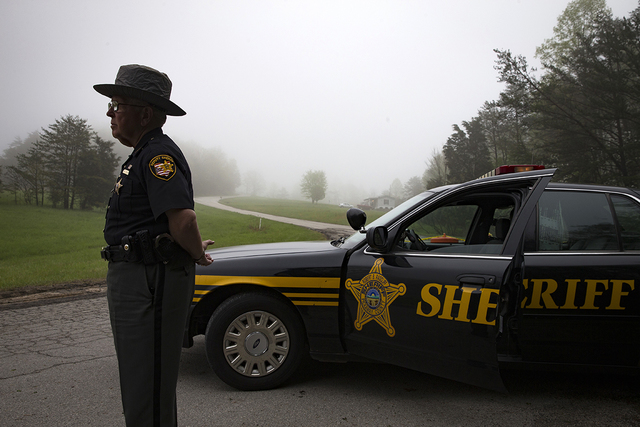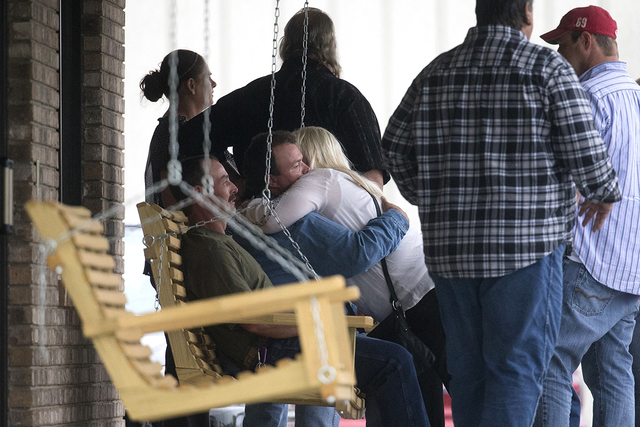PIKETON, Ohio — From her house on Union Hill Road, Brittany Barker heard the first sirens first thing in the morning. She looked out and saw four police vehicles rush past. That was only the beginning. ADVERTISING PIKETON, Ohio —
PIKETON, Ohio — From her house on Union Hill Road, Brittany Barker heard the first sirens first thing in the morning. She looked out and saw four police vehicles rush past. That was only the beginning.
“They just kept coming, kept coming, and kept coming,” she recalled.
Authorities in this struggling corner of Appalachia were dealing with what turned out to be one of the worst mass killings in Ohio history: Eight family members were shot to death at four homes scattered across a few miles of countryside in what investigators have portrayed as a meticulously planned “execution.” Nearly all were shot repeatedly — one, nine times — and some were also beaten.
What looked to some people like a feud within a family, possibly a murder-suicide, soon took on a more sinister cast when authorities disclosed a large-scale illegal marijuana growing operation at one of the crime scenes and said pot was being cultivated at some of the other homes, too. Ohio’s attorney general also said there were signs of cockfighting at one of the properties.
Nearly a week after the killings, though, authorities have announced no arrests and no motive, an unsettling silence considering the huge investigative force brought to bear in this thinly populated county where many people either knew the victims or knew of them.
Since the discovery of the bodies April 22, over 215 law enforcement officers have been involved in the investigation, with several hundred tips received and more than 50 people interviewed.
Attorney General Mike DeWine has said he doesn’t want to telegraph the killer or killers what investigators know.
Relatives of the victims said they were surprised by the marijuana. Some neighbors said they had heard rumors. And some said the marijuana-growing was a case of courting trouble.
“If you don’t go around bad places, the odds of something bad happening to you are pretty slim,” said Ron Lucas, a paper-mill worker who lives a few miles from where the killings took place.
But Angie Tolliver, a home health aide, said that whatever connection drugs may have had to the slayings, “Nobody deserves that. That’s just evil.”
Large marijuana operations are common in Pike County, scene of the killings. Authorities in 2012 said the seizure of about 1,200 plants in Pike County could be related to a Mexican drug cartel, while in 2010 more than 22,000 plants were confiscated. Marijuana is grown widely in parts of southern Ohio, where the dense forests and rural roads make it easy to hide the crop, and where many people need the money.
While the cleanup of a shuttered Cold War-era uranium plant employs hundreds of people in some of the best-paying jobs around town, about one-fifth of Pike County’s 28,000 residents live in poverty, and the area roughly 80 miles east of Cincinnati consistently has some of Ohio’s highest unemployment and drug-overdose death rates.
Investigators won’t say if the killings are related to the marijuana, and law enforcement officials not associated with the investigation cast doubt on any cartel connection, saying there are no signs of it in Ohio.
Meanwhile, Cincinnati-area restaurateur Jeff Ruby tweeted Thursday that he is withdrawing the $25,000 reward he had offered for information leading to an arrest and conviction. He cited “recent complex criminal developments.” A message left with his spokeswoman was not immediately returned.
The victims were 40-year-old Christopher Rhoden; his ex-wife, 37-year-old Dana Rhoden; their three children, 16-year-old Christopher Jr., 19-year-old Hanna and 20-year-old Clarence, or “Frankie”; Christopher Rhoden Sr.’s brother, 44-year-old Kenneth Rhoden; their cousin, 38-year-old Gary Rhoden; and 20-year-old Hannah Gilley, whose 6-month old son with Frankie Rhoden was unharmed.
Two other children, Hanna Rhoden’s 4-day-old daughter and Frankie Rhoden’s 3-year-old son, also were unharmed.
Neighbors accustomed to leaving doors open are settling into a nervous new reality. Gone is the sound of the loud truck that Frankie Rhoden used to drive up and down Union Hill Road. Sheriff’s deputies sit round-the-clock in cruisers on either end of the hilly road, keeping out everyone but residents, approved visitors and investigators.




